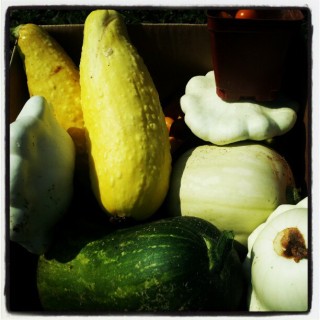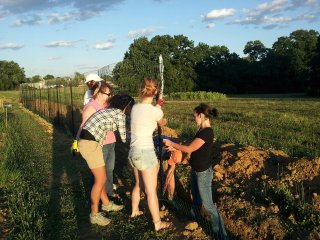This morning I walked the bear over at Lancaster Community Gardens. When I got there, two of the gardeners were there.
One was mapping out a new teaching garden for students, and the other was clearing the western plot for tomorrow’s United Way Day of Caring, where about two dozen volunteers will help prep the land for seed.
The gardens are split into two plots–eastern and western. The eastern plots are rented annually by whomever agrees to the rules and lays on 20 bucks (organic methods, no chemicals, keep your clothes on, etc). 600 square feet on the north side are dedicated to community benefit.
 |
| early plotting |
The western plots are part student gardens, community benefit plots, and one or two private plotholders.
Ron, the bear and I walked around the community plots. He said he had harvested about 50 lbs of veggies and dropped them at the Lancaster Council of Churches. To date we’ve harvested over 200lbs, which isn’t bad given the early July planting.
 |
| first harvest |
Tomorrow we’ll prep about 1/6 of an acre for spinach, lettuce, and a few other fall crops. If we’re lucky we’ll get some starters donated from local nurseries.
From the beginning of the project, the volunteers have made the difference between success and failure, great outcomes and mediocre or poor ones.
On Sunday, the plotholders and volunteers will hold a potluck dinner to share garden stories and plan for the Fall and Spring.
It’s amazing what people can do if given a common purpose with the major obstacles removed.
And part of the success came when I learned to step back and let people do what they were compelled to do, instead of trying to control everything.
 |
| many hands makes light work |
Control’s great and necessary when running a production line where there’s a need for repetitive work, not a lot of thought or judgment. It’s not so great in creative production environments like software development.
That was a lesson I learned over the years running startups as well; control needs to be applied very judiciously and sparingly.
The job isn’t to run things, it’s to create an environment where your people take care of things because they’re driven to do it, whether through personal responsibility, mutual obligation, or a commitment to getting things done.
The more you try to control that, the less control over the final outcome you’ll have, and it will likely suck.
It’s ok to ask questions; sometimes by asking a question you help someone find the answer simply because you phrased things differently. Or by letting them know they have a budget to work with, or that they shouldn’t worry about time, just get it done right.
So provide guidelines and guidance. Create a light framework of principles that informs everyone’s vision, planning, decision-making, and execution.
Have your team tell you how they’re going to get it done. Remove the obstacles for them, and provide what’s needed to get things done in as clean and efficient way as possible.
Back to the gardens; you reap what you sow. My tomatoes came out ok, peppers half grew, the spaghetti squash isn’t quite ready, and the tomatillos never really got ripe.
I’ll have to pay more attention next year, but it’s great to see what our volunteers were able to do this year, largely on their own initiative.
Leave a comment